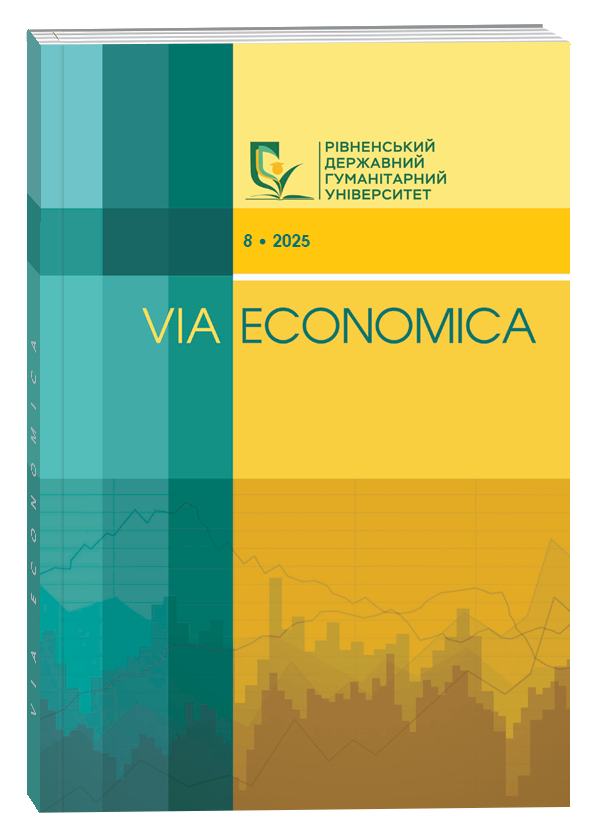CONCEPTUAL BASES OF ENTERPRISE CASH FLOW MANAGEMENT
Abstract
The article considers the theoretical principles of cash flow management of enterprises as a financial management key aspect. It is noted that effective management of financial resources is the key to the financial stability of the enterprise, its liquidity and strategic development. Existing scientific approaches to cash flow management are analyzed, in particular the concepts of foreign and domestic scientists. The authors define cash flows as a set of receipts and outflows of funds in the economic activity process that affect the enterprise financial stability. The cash flows classification by direction of movement, types of activity, occurrence time and relationship to cash reserves is considered. The main principles of cash flow management are determined, including forecasting, cost optimization, management of receivables and payables, the use of digital technologies and financing sources diversification. The main methods of cash flow management are described: budgeting, forecasting, liquidity analysis, financial modeling and the use of automated systems. A description of cash flow management models is provided, in particular the Miller-Orr, Baumol, coordination and discounted cash flow models. Key indicators for assessing the financial flows of an enterprise are determined: net cash flow, operating cash flow, liquidity, cash turnover, financial independence ratios and interest payment coverage. Strategic directions for increasing the efficiency of cash flow management are investigated, in particular the use of modern financial technologies (FinTech), credit policy optimization, cost reduction and currency risk management. The authors emphasize the importance of a comprehensive approach to financial management, which includes strategic planning, forecasting, debt control and the implementation of modern technologies. The conclusions emphasize the importance of effective cash flow management for ensuring the financial stability of an enterprise and its long-term competitiveness. Directions for further research are proposed, in particular, the introduction of artificial intelligence into financial planning, analysis of the macroeconomic factors impact on cash flows, and research into the possibilities of integrating FinTech solutions into the financial strategy of enterprises.
References
Fama E., Jensen M. (1983). Separation of Ownership and Control. Journal of Law and Economics, 26 (2), рр. 301–325.
Brealey R. A., Myers S. C., Allen F. (2020). Principles of Corporate Finance. McGraw-Hill Education. Рр. 918.
Keynes J. (1936). The General Theory of Employment, Interest and Money. Macmillan. Рр. 351.
Ross S., Westerfield R., Jaffe J. (2021). Corporate Finance. McGraw-Hill Education. Рр. 864.
Podderohin A. M. (2019). Finansovyi menedzhment pidpryiemstva [Financial management of the enterprise] Kyiv: KNEU. P. 535. (in Ukrainian)
Savchuk V. P. (2018). Teoriia ta praktyka upravlinnia hroshovymy potokamy [Theory and practice of cash flow management]. Kharkiv: Finansy i statystyka. P. 440. (in Ukrainian)
Kovalchuk O. S. (2020). Hroshovi potoky yak osnova finansovoho menedzhmentu [Cash flows as the basis of financial management]. Lviv: LNU. P. 251. (in Ukrainian)
Mnykh Ye. V. (2018). Finansovyi analiz: metody ta modeli [Financial analysis: methods and models]. Kyiv: KNEU. p. 536. URL: https://knute.edu.ua/file/Mg==/cbbc55fcb084e5aefc85ef1f6f55ad91.pdf
Gitman L. J., Zutter C. J. (2018). Principles of Managerial Finance. Pearson. Рр. 928.
Damodaran A. (2012). Investment Valuation: Tools and Techniques for Determining the Value of Any Asset. Wiley. Р. 992.
Higgins R. C. (2018). Analysis for Financial Management. McGrawHill Education. Р. 464.
Brigham E. F., Houston J. F. (2021). Fundamentals of Financial Management. Cengage Learning. Р. 832.
Fama E. F., Jensen M. C. Separation of Ownership and Control. The Journal of Law and Economics. 1983. Vol. 26, № 2. P. 301–325.
Brealey R., Myers S., Allen F. Principles of Corporate Finance. 13th ed. New York : McGraw-Hill Education, 2020. 918 p.
Keynes J. M. The General Theory of Employment, Interest and Money. Atlantic Publishers & Dist, 2016. 351 p.
Ross S., Westerfield R., Jaffe J. Corporate Finance. New York : McGraw-Hill/Irwin, 2021. 864 p.
Поддєрьогін А. М. Фінансовий менеджмент підприємства: підручник. Київ : КНЕУ, 2005. 535 с.
Савчук В. П. Теорія та практика управління грошовими потоками. Харків : Фінанси і статистика, 2018. 440 с.
Ковальчук О. С. Грошові потоки як основа фінансового менеджменту. Львів : ЛНУ, 2020. 251. с.
Мних Є. В. Фінансовий аналіз: методи та моделі. Київ : КНЕУ, 2018. 536 с.
Gitman L. J., Zutter C. J. Principles of Managerial Finance. Edinburg : Pearson, 2018. 928 р.
Damodaran A. Investment Valuation: Tools and Techniques for Determining the Value of Any Asset. 3rd ed. Wiley, 2012. 992 р.
Higgins R. C. Analysis for Financial Management. New York : McGraw-Hill Education, 2018. 464 p.
Brigham E. F., Houston J. F. Fundamentals of Financial Management. 15th edition. South-Western: Cengage Learning, 2018. 832 р.


